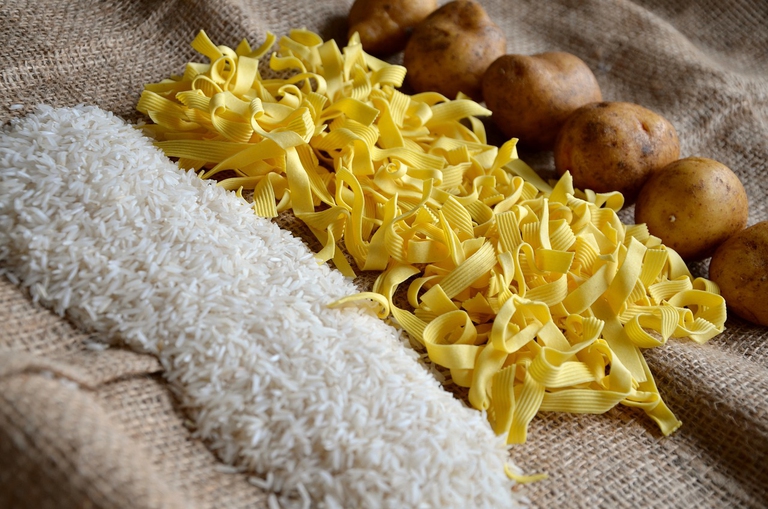https://www.lifegate.it/i-carboidrati-nella-dieta-del-cane
- |
- Carbohydrates are an element of our dogs' daily diet.
- But their integration into the bowl is subject to some important rules.
- Let's try to better understand the function of these foods to use them in the best way.
THE carbohydrates are they good for dogs?Are these primary foods in the four-legged diet?There are dogs intolerant, allergic or who simply cannot digest carbohydrates?There are so many questions asked by those who live in close contact with a furry friend and, often, it is not possible to take stock of the situation to identify an optimal intake of nutrients useful for an active and well-being life.The question, then, arises more often when talking about so-called breeds primitives, therefore closer in genetic heritage to wolf.And here opinions become divided and it becomes difficult to be able to formulate correct hypotheses.
An example?Breeds like the Czechoslovakian wolfdog, in which the DNA he gets really close to the Great Predator.An opinion for everyone?That of Alessio Camatta who breeds these dogs with the affix Athanor Lupus:“All my subjects have always eaten carbohydrates, from normal kibble, to bread and rice-based supplements added to meat.And, in this regard, I have seen many dogs solve nutritional problems by introducing supplement products of this type into their diet.There will certainly be some intolerant four-legged friends, but from empirical experience I have the impression that they are very few compared to what one would like to believe based on the urban legend that breeds very similar to wolves do not digest starches."
On the other hand, among lovers of small sizes the urban legend changes and we talk about more or less serious intolerances to meat and animal proteins in general.To take stock of the situation regarding carbohydrates in the canine diet, let's try to understand more with the help of the nutritionist expert.In this case the Dr. Misa Sandri Of Nutrigenic, animal scientist specialized in dog nutrition and dietetics.

Carbohydrates, these unknowns
Carbohydrates or carbohydrates they are a large category of substances widespread in both the plant and animal world.They have numerous functions:they constitute, for example, a reserve of energy for both plants and animals, or take on a structural function as happens in the plant world.The simplest carbohydrates are sugars such as fructose (fruit sugar), galactose (component of lactose) and glucose (present in green plant tissues, blood and animal tissues as an energy source).Glucose is the carbohydrate into which other carbohydrates must be transformed to be used by both the human and dog organisms.
Complex carbohydrates or polysaccharides, instead, they are chains of carbohydrates of various lengths and structures.Those of interest for human and canine nutrition are distinguished, due to their physiological role, in digestible (starches) and indigestible (fibers).The job of starches is to provide energy.They are, in fact, easily digestible and metabolisable, and are able to preserve various nutritional resources (proteins and lipids) useful for other purposes.The function of fibre, normally indigestible by human and dog metabolism, is to nourish the intestinal environment through use by microorganisms in the microbiome to promote their health and well-being.

Carbohydrates in the dog's diet
As with humans, the function of carbohydrates in dogs is twofold.Polysaccharides or complex carbohydrates are an excellent source of energy (digestible complex carbohydrates) or promote intestinal health and a sense of satiety (indigestible complex carbohydrates).The substantial difference is that the dog, unlike man, is a carnivore and not a omnivorous, so the starch portion of his diet should never represent the main source of energy, although dogs are able to digest them very efficiently.
Often, when it comes to canine nutrition, we hear about feed grain free.This is a term often used only for marketing reasons and which misleads consumers looking for an optimal diet for their four-legged companion.Grain free is a definition borrowed from the English language, in which “grain” generically indicates seed or grain, regardless of botanical origin.In the world of pet food it has been associated, somewhat erroneously, with the word "cereal", in turn combining the word “cereal” with carbohydrate or starch.A grain free feed, therefore, is a food that does not contain cereals in its composition.This does not mean (in fact sometimes it is quite the opposite) that the feed under consideration does not contain starches, which on the contrary can originate from numerous other foods such as potatoes And peas.
Grain free feeds do not normally have particular differences in terms of nutrient content (i.e. proteins, fats and starches) compared to those containing cereals.In their case, however, the source of starches is not the latter.Foods of this type can be used without particular problems by all dogs, as long as they are of good quality.And they become important, to the point of constituting an obligatory choice, precisely for those four-legged friends with adverse reactions or a manifest intolerance to cereals.

Dogs and digestion
The dog has an excellent enzymatic set for the digestion of digestible polysaccharides (starch), deriving from thousands of years of evolution alongside man.For the canine species, therefore, these foods represent an excellent source of energy, even if there are no indications of specific needs.The most common sources of starch in dog nutrition are rice, corn, spelled And barley among cereals, but also potatoes, millet, sorghum, without forgetting some legumes like peas. It is good to remember, however, that dogs remain carnivores, so the daily quantity of these elements should never represent the primary source of energy (which remains made up of proteins and lipids).In principle you should not go beyond 30% of the ration in healthy subjects.
In some dogs, however, intolerances to foods that are a source of carbohydrates such as, for example, may occur rice.But what is thought to be an intolerance to these compounds is often actually one digestibility less than optimal feed or limited digestive capacity of the animal.There are certainly limits to the carbohydrate content beyond which some breeds struggle to digest the food, but this too depends on the quantity, and not on an actual intolerance.Often, in fact, this problem is not actually caused by cereals per se, but rather by them quality and above all from level of inclusion (i.e. the quantity) present in the feed.And, in these cases, the help and advice of the veterinary nutritionist is a must.

The BARF diet and carbohydrates
It's a question that many ask themselves.Can a dog be fed an absolutely carbohydrate-free diet?In theory one could say yes, even if in practice there is no exhaustive scientific literature on the matter, especially as regards nutrition. BARF.The observation that arises spontaneously concerns more than anything an evolutionary aspect, namely the fact that compared to the wolf, over thousands of years the dog has developed in its DNA the genes suitable for digesting carbohydrates to live alongside humans.In fact, since the evolution of the canine species, carbohydrates represent an easily available source of energy, and it would be limiting not to consider it.
In the absence of carbohydrates the dog obtains energy from fats and give them proteins, with a rather high energy expenditure compared to the latter, and there will be more unusable compounds that will subsequently have to be disposed of by the body.Lipids provide a large energy supply, but if not managed well in terms of quantity, in addition to making you fat, they represent a potential risk for organs such as the pancreas, and normally they do not completely satiate the animal.In conclusion it could be said that carbohydrates in the canine diet are an excellent source of energy, but they must be in limited quantities, come from controlled and possibly organic supply chains and be treated appropriately in terms of cooking to optimize their digestibility.
